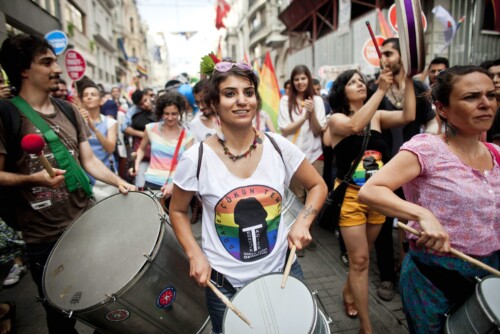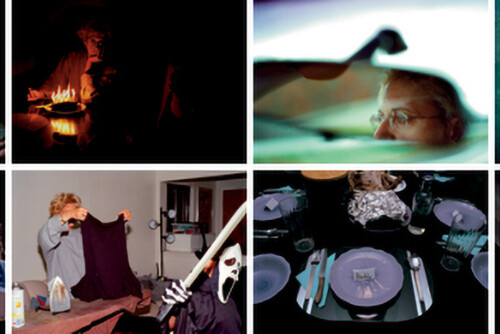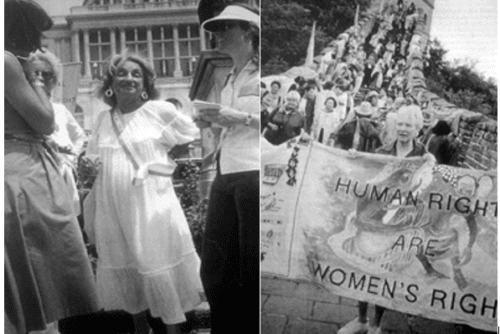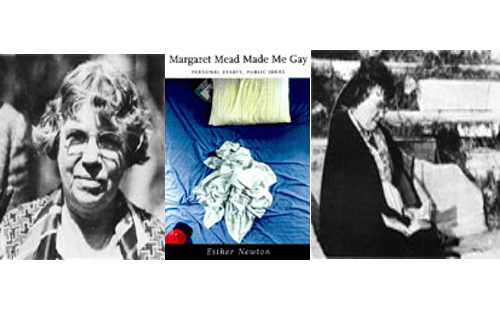Global Positions and “Third World Gays”
What are “the implications of an organized international pressure on national gay entities?” “Is outside pressure on gay topics likely to produce positive or negative results?” What should activists do in relation to countries without organized movements — “Do they want our assistance? Do they need it? What can we do anyway?” These questions were posed in a discussion paper titled, “Into the 1980s,” which was circulated among participants at the Second Annual IGA Conference, placing international solidarity, especially with the “Third World and socialist countries,” among the key areas of concern for a fledgling international movement at the dawn of a new decade. 1
The question of geopolitical representation had already emerged within IGA. Indeed, though participants at its founding meeting, all gay men, initially intended to create a European association, activists from the U.S. and Australia argued successfully for a global reach. 2 Its founding document expressed its universalist aspirations, affirming “the fundamental pride that gay women and men take in their sexual orientation,” the “failure of nations” to ensure their rights, and the consequent “need for international solidarity in the face of universal oppression.” 3
The European or Western boundedness of the organization, however, remained a dilemma in its first years of existence. At its First Annual Conference, in Bergen, Netherlands, in 1979, the status of “third world” gays and lesbians was raised in a workshop on Human Rights. A resolution presented by Britain’s Gay Activist Alliance (GAA) condemning the exploitation of “third world gays by gay male tourists” was narrowly defeated after “heated debate,” given what many regarded as a lack of information on the matter. 4 Various organizations agreed to obtain information on the status of gays and lesbians in specific third-world and socialist countries, to be presented at the second annual conference, though no results were ultimately produced. 5
It was really at the second and third annual conferences that discussions on the matter gained traction. So too did the question of gender representation, underscoring larger concerns over power dynamics within the movement. 6 Though multiple views were expressed within ILGA, the two discussion papers mentioned above illuminate important contours of these debates. The Scottish Homosexual Rights Group (SHRG), which spearheaded early discussions, commissioned the paper circulated at the Barcelona meeting, titled “The Third World — Gay Liberation” and written by Ian Buist, of the U.K.-based Campaign for Homosexual Equality. The third conference was regarded as an important turning point on the matter as the first to include a sizable presence of “third-world” organizations, all from Latin America and the Caribbean. There, Mascarenhas’s paper was circulated, titled, “The Third World and the Gay Liberation Movement.” Both papers addressed the same question: what are the chances for gay liberation in the so-called third world? Partly reflecting each author’s positionality, while Buist focused on the terms for its acceptance in an undifferentiated third world, Mascarenhas sought to disaggregate the imagined topography and discern conditions necessary for success among countries presumably encapsulated by the term. Both also saw gay liberation as in some ways bound to “Western” modernizing projects, though again, they differed over the implications.
Buist began his paper by identifying “two main obstacles to our getting across to the people in the Third World what we have learnt ourselves and the standards we would like society to apply in dealing with its gay members.” First, against the backdrop of decolonization and independence, economic and population growth and the rapid expansion of education and communication technologies had created a particularly complex political juncture for the movement. Together, he argued:
These [trends] spell unceasing ferment in the way of living and thinking of millions — not least, those most in contact with new ideas. Third World societies and governments are deeply ambivalent about this influx. They cannot do without them, or without mechanisms of the western world to secure their own existence and survival. But as old and static ways of thought wash away, there is a resentment and sense of being dependent — almost patronized. This creates a determination to preserve, or if necessary to reinvent, their own heritage, so as to affirm their distinctive personality… Against this background, the call for gay liberation will be rejected as ‘decadent cultural colonialism[’] unless it is firmly linked to the evolution of domestic social traditions.
The second obstacle concerned Buist’s understanding, “that virtually all third world societies either make no provision whatever for homosexual emotion or do so in a way which most of us would find profoundly unsatisfactory.” Interestingly, at this moment before homonationalism — or when certain pieces of its “assemblage” were just being set in motion —, he argued that in this respect, there was much in common with Western societies, where “homosexuals [were] living precariously on the fringe.” The third world, however, was at a disadvantage, having been bypassed by the “glorification of individuality” fostered by the European Renaissance and Western liberalism, leaving most people duty-bound to culture, family, and clan. 7
Against the dilemmas of anti-Western nationalism and homophobia, Buist identified two unlikely sources of change: population growth and sex-selective abortion. In a future “Malthusian nightmare” of teeming masses, he contended, overpopulation would inevitably transform third-world attitudes toward sex and family. And with a nod to science fiction, he predicted that the overabundance of men produced by sex-selective abortion would confer a newfound “scarcity value” on women that would lead to their greater economic and social liberation.
With echoes of postwar modernization theory, Buist’s analysis inscribed gay liberation within larger development narratives, an extension of the modernizing winds sweeping away the “old and static ways of thought” of non-Western societies. These echoes undoubtedly owed something to his personal background. Buist joined the British Colonial Office in 1952 in the spirit of altruism, because, as he recalled in an extended oral history, he believed that, “throughout history, people should be judged according to the way in which they carried out their responsibilities for others.” 8 Initially stationed at the Kenya and Uganda desk of the East Africa Office, he saw himself as a reformer within the British colonial administration. Early in his career, for instance, he participated in a commission that investigated the Kenyan police force and recommend an end to racial hiring and stratification within its ranks. This experience, he would recall, “probably contributed to [his] later membership [in] Amnesty International!,” suggesting some of the persistent ambiguities of reformist movements in the context of international power asymmetries. 9
With the dismantling of the Colonial Office, Buist returned to the United Kingdom where he joined the Ministry of Overseas Development. His return also marked the beginning of his involvement in gay activism. He was the first openly gay civil servant accepted in the diplomatic service, and he would lead efforts to secure anti-discrimination provisions within the British diplomatic corps. In 1972, he joined the Campaign for Homosexual Equality, a decision that marked a commitment not just to activism but to a position within the movement: “I strongly believed that the right way to achieve change was for all of us to work within whatever social organizations and groups we might belong to … The [Gay Liberation Front] idea of an anti-family, anti-Establishment social revolution seemed to me unlikely to produce change for the better.” 10 At the time of the second annual conference in Barcelona, where his piece was circulated, Buist was the Under-Secretary in the Overseas Development Administration, in charge of British relations with regional and multilateral banks.
However well-intentioned, Buist’s unreflective universalization of norms across a third-world imagined as an undifferentiated mass and facile dismissal of alternative expressions of same-sex desire across vast swaths of the globe revealed a certain ethnocentrism. In her classic critique of feminist discourses on “third world women,” Chandra Mohanty suggests that this sort of reductive analysis of sexual politics through the prism of a “cross-culturally singular, monolithic patriarchy” — or homophobia — simultaneously constructs “third world difference” in binary opposition to a presumably enlightened West. 11 Indeed, as Latour observes, the suppression of heterogeneity provides the ground for progress narratives of modernization. 12 While reinscribing familiar teleologies of modernity and tradition onto a (dare-I-say traditional) imagined cartography dividing the West and the Rest, however, it is notable that Buist recognized within this dynamic the political invention and reinvention of tradition, and in such rearticulations the possibilities for a sexual politics unmoored of its Western baggage.
The question of how to engage with third-world and socialist countries received broader attention at the conference in the context of a workshop on human rights. Delegates broadly agreed on the importance of sharing information across national boundaries. No agreement, however, was reached on the question of “spectacular actions” intended to call attention to conditions in countries without organized movements. Representatives of the Italian group FUORI!, which had engaged in such actions, regarded them as a duty “where gays in a country are unable to speak for themselves.” 13 Others, however, saw them as a “refined type of imperialism” that might provoke a backlash. Participants resolved to leave such actions to the discretion of national organizations. 14 Today, ILGA’s constitution resolves the question stipulating that support must be “locally initiated.” 15
After the conference, the SHRG, which had commissioned Buist’s paper, pressed the discussion. An article in the Canadian publication The Body Politic referred to a statement by the group suggesting that, “unless action is taken, there is a danger that the IGA will remain a Western organization, specifically concerned with European matters” and calling on IGA members to provide free literature to third-world groups and subsidize their attendance at the next IGA conference. 16 To this end, the SHRG proposed a model of “twinning,” whereby groups would pair across first and third worlds to exchange literature, and organizations in wealthier countries would finance twins’ attendance. The SHRG established the first “twinning” relationship with the Gay Freedom Movement, from Jamaica. Other European groups were slow to follow, though several ultimately did. 17
At the Turin conference, the “third world” received unprecedented attention, again, largely due to the presence of Latin American and Caribbean delegates. 18 For the first time, a working group on the third world was created, and two discussion papers were circulated on the matter. One of them, written by the National Executive Committee of the SHRG, cautioned IGA against dictating strategies “only applicable in the West.” It again underscored the importance of exchanging information and subsidizing third-world delegates’ participation at IGA conferences and advocated the use of UN fora and the promotion of antidiscrimination based on sexual orientation as a universal human right. 19
The second was written by João Antônio Mascarenhas, a founder and important leader of Brazil’s homosexual liberation movement. Born in the state of Rio Grande do Sul, he spent most of his life in Rio de Janeiro. He studied law, but after his father’s death, was able to live largely off his inheritance and dedicate himself full-time to activism. His importance to the movement stemmed in part from his strong advocacy of international linkages. The first Latin American activist to join IGA as an individual member, he actively promoted contacts, including twinning, between Brazilian activists and their counterparts abroad. 20 He also became an early advocate of engagement with political institutions against more radical, liberationist activists, who rejected such engagement as either normalizing or useless. In this regard, his position within the movement was not unlike Buist’s among activists in the United Kingdom. Their shared institutionalist leaning found some resonance in IGA, which, while encompassing groups that embraced more radical liberationist politics, generally advanced a reformist agenda prioritizing engagement with international institutions through a human rights frame. 21
1.) These are all developed countries. Though Brazil was not, this was not a problem, given Brazilians’ openness to outside influences, particularly among the middle class, which “suffers intensely from…‘cultural colonialism’” and would therefore be particularly willing to embrace models from overseas;
2.) These are societies with strong middle classes. In Brazil, he suggested, gay liberation was fundamentally a middle-class project. The upper class did not care about sexuality; and the lower class, particularly in cities, had “a truly revolutionary lifestyle,” reflected in widespread practices of bisexuality among men who did not necessarily identify as homosexual. “For them,” he explained, “sex is something that one does and enjoys; not something one discusses.” Hence the middle class, which shared more in common with the European middle class than the two region’s respective working classes, stood to benefit most from gay liberation and consequently from international support;
3.) These are white-majority countries. He included this point, he explained, because Americans and Europeans ascribe such weight to it; but he regarded its relevance to Brazil as limited, given the absence of racial prejudice in the country: “I have never heard of an initiative being rejected because it was oriented to Brazilian whites,” an observation that presumably extended to gay liberation;
4.) Like Brazil, these are Christian-majority countries;
5.) Like Brazil, they are capitalist;
6.) They are democratic countries. Though Brazil was not, the military government’s announcement of a gradual democratic opening had already paved the way for societal mobilization and political change;
7.) These are all Western countries, which again bode well for Brazil, as he explained: “We were discovered and colonized by Portugal; our language is Portuguese; our religion is Roman Catholic … our laws are deeply influenced by German, French and Italian legislation. Our culture is very Western-oriented. We belong to the Western bloc … and we do not find any reason to be ashamed of that.”
On the basis of this analysis, he concluded, developed countries should help “gay liberation” not in “the’Third World,” understood as a homogeneous mass, but in certain countries that shared the characteristics he enumerated, where such help could presumably go furthest. In Latin America, he concluded, such countries would include Colombia, Mexico and Brazil; and after the end of repressive dictatorships, Argentina, Uruguay and Chile. Having attained relatively greater levels of economic development, these countries had important middle classes and incipient homosexual liberation movements that could use outside support. 22
Mascarenhas’ analysis revealed several problematic blind spots. His reiteration of the dominant ideology of Brazilian racial democracy undoubtedly reflected his own position of racial and class privilege within Brazilian society. And while his comments regarding the revolutionary sexual lifestyle of the Brazilian working class marked a departure from Buist’s dismissal of expressions of same-sex sexuality that people might enjoy without discussing as “profoundly unsatisfactory,” it conversely romanticized sexualities outside a repressed middle class and seemed unusually oblivious to dynamics within Brazil at the time he was writing. He did not mention, for instance, the black gay organizations in São Paulo and Salvador that were challenging racism within the movement and growing gay and lesbian commercial enclaves, or the routine state repression faced Brazilian travestis, who also occupied the utopian working-class spaces he idealized, let alone their lives and politics.
But what is most striking about his analysis — and underlies its many blind spots — was the close association he drew between gay liberation and Western modernity. In this respect, he echoed the development narratives underlying Buist’s analysis the previous year, though he drew different conclusions about their implications. Gay liberation, he seemed to suggest, could prosper only at a certain stage of economic development, not only among but within Latin American nations, specifically in those places that looked most like Europe. (And international support should flow accordingly to be effective.) If Mascarenhas’s affirmation of Brazil’s Westernness, on the one hand, pushed back against Buist’s vision of the Third World as a homogeneous space beyond Western boundaries, it reinscribed an equally totalizing binary between the West and its Other within Brazilian society. The political scientist Alan Rouquié (1989) has suggested that Latin America’s “singularity” in relation to such imagined cartographies rests in the Eurocentrism of its political elites, pointing, for instance, to a proposal made by Latin American countries at the United Nations to commemorate Columbus’s “discovery” of the New World, against the objection of Asian and African nations. This vision, Rouquié suggests, has in some ways facilitated technical, cultural and migratory flows between “old and new worlds” — an observation that Mascarenhas extended to certain strategies of sexual politics — even as it has reproduced and obscured various modalities of post-colonial violence, as reflected in his blind spots.
Mascarenhas returned to Brazil as the Brazilian movement was embarking on its first major experiment in electoral activism and entry into the arena of formal politics. Again, his significance within the movement was in part due to his promotion of both state-directed activism and international ties. And from the outset, Brazil’s movement was highly articulated with counterparts abroad. By the end of 1981, for instance, several groups had twinned with European counterparts: SOMOS/São Paulo, with the Danish group Forbundet af 1948; Somos/Rio de Janeiro and Auê/RJ, with the Swedish group RFSL; the Autonomous Lesbian Feminist Group/SP, with the Finnish group SETA and Denmark’s Lesbisk Bevagelse; and the Grupo Gay da Bahia, with AHA/Berlin. 23 Leading up to the election, activists drew, sometimes unknowingly, on resources obtained through IGA, such as a questionnaire that was circulated among political parties, part of a global survey promoted by the association. Moreover, as Mascarenhas wrote to an activist in England at the time, he often cited European precedent in the course of these campaigns, seeking to take advantage of culturally colonized politicians, who might support gay rights if they knew that “before them, Oslo, Strasbourg, and Paris took the initiative.” 24 This is not to say that Brazilian activists overall embraced his approach. Rather, as I have elaborated elsewhere, 25 Mascarenhas’s efforts to engage Brazilian political parties, from left to right, confronted opposition by some who believed the movement should adopt a preferential option for the left and others who believed it should steer clear of the state entirely.
- David Russel, European representative of New Zealand’s National Gay Rights Coalition and CAMP-Australia, “Report on the Second Annual Conference,” International Association of Gay Women and Men (IGA), Newsletter, 80(1), April 4-7, 1980, http://www.openup-lgbtcollections.org/.[↑]
- ilga.org[↑]
- “Foundation Document of the IGA – International Association for Gay Women and Men,” Newsletter, 80(1), April 4-7, 1980, pp. 3-4, http://www.openup-lgbtcollections.org/.[↑]
- “World groups plot strategy,” The Body Politic, no. 54, July 1979, http://archive.org/stream/bodypolitic54toro/bodypolitic54toro_djvu.txt.[↑]
- Documents concerning the IGA Interim Meeting, Brighton, 1979, Organisation/International/1979/ Box87/Folder 7, http://www.openup-lgbtcollections.org.[↑]
- With only four women among the 65 delegates attending, gender parity was defined as a goal at IGA’s first conference. The 170 delegates attending the second conference included 45 lesbians, who established the International Lesbian Information Service (ILIS) as an autonomous secretariat within IGA. ILIS held a conference in Turin prior to the IGA meeting, attended by about 150 delegates. A decision was made to sever ties with IGA and several boycotted the latter meeting in light of the expense. Only 21 of 117 delegates at the third conference were women. Documentation of these early conferences includes some limited references to trans people or activism. ILGA created a trans secretariat only in 2006. “Third Annual Conference Report – Mistakes,” Bulletin ,81/1, June 27, 1981, p. 7 & “Documents concerning 5th ILIS Conference, 1-4 April 1983, Paris, France, ILIS International Meeting, 1983, http://www.openup-lgbtcollections.org; “World groups plot strategy,” The Body Politic, no. 54, July 1979, http://archive.org/stream/bodypolitic54toro/bodypolitic54toro_djvu.txt; “Chris Bearchell discovers familiar fears – and hopes – at the IGA conference in Italy – Schisms and sharing at Torre Pellice,” The Body Politic, no. 74, June 1981, http://archive.org/stream/bodypolitic74toro/bodypolitic74toro_djvu.txt; and http://ilga.org/.[↑]
- “Gay Liberation – The Third World,” prepared by Ian Buist (SHRG/CHE, for Campaign for Homosexual Equality – group in England/Wales – dated 1979) on behalf of the Scottish Homosexual Rights Group, Discussion paper, Second Annual IGA Conference, IGA Information Centre and Secretariat, Barcelona, Spain, April 4-7, 1980, http://www.openup-lgbtcollections.org.[↑]
- John Latto Farquharson (Ian) Buist, 1930-2012, diplomat. 2008 (April 8). Interview by Malcolm McBain. British Diplomatic Oral History Programme. No. DOHP 118, https://www.chu.cam.ac.uk/media/uploads/files/Buist.pdf, 3.[↑]
- ibid, 7.[↑]
- ibid., 132.[↑]
- Chandra Talpade Mohanty, “Under Western eyes: Feminist scholarship and colonial discourses,” Boundary, 12(3) (1986), 335.[↑]
- Bruno Latour, We Have Never Been Modern , trans. Catherine Porter (Cambridge: Harvard University Press, 1993).[↑]
- Angelo Pezzana, a founder of FUORI and IGA, had been arrested in Moscow in 1977 for protesting the criminalization of homosexuality. Another FUORI leader Enzo Francone was arrested in Tehran in 1979, shortly after feminist Kate Millet had been expelled from Iran for protesting the treatment of women, and in Moscow the following year. “Stop press…“ IGA News 2(1), March 1979, p. 20, http://www.openup-lgbtcollections.org; ILGA-Europe, Delegate Pack, 15th ILGA-Europe Annual Conference, 2011, http://www.ilga-europe.org/sites/default/files/Attachments/report_conference_host-2014_0.pdf.[↑]
- “Workshops-Human Rights,” p. 6, and “Plenary Sessions,“ pp. 12-15, Newsletter, 80.1, 1980, http://www.openup-lgbtcollections.org/; Tim McCaskell, Report on Second Annual IGA Conference, The Body Politic, no. 64. June/July 1980, http://archive.org/stream/bodypolitic64toro/bodypolitic64toro_djvu.txt.[↑]
- http://ilga.org/.[↑]
- “Scots urge debate on Third World Gays,” The Body Politic, no. 71, March 1981, https://archive.org/stream/bodypolitic71toro/bodypolitic71toro_djvu.txt.[↑]
- “Report of the 3rd Annual Summer Meeting, Stockholm, Sweden, 21st-23rd August. 1981,” IGA – Bulletin, (3/4), October 17, 1981, http://www.openup-lgbtcollections.org.[↑]
- The working group included two gay men from Venezuela, one from Jamaica, one from Brazil, one gay man and two lesbians from Mexico, and one lesbian from Puerto Rico. Several European activists participated as observers. João Antônio Mascarenhas, Rio de Janeiro, Carta Circular (Letter circulated to nine gay and lesbian groups in Brazil), December 26, 1981, Edgar Leuenroth Archive, University of Campinas (AEL/UNICAMP). By comparison, only one activist, from Mexico, participated at the Barcelona Conference.[↑]
- SHRG National Executive Committee, “III World and Eastern Europe”, Third Annual Conference – Agenda and Papers, Newsletter 81-1, http://www.openup-lgbtcollections.org.[↑]
- Robert Howes, “João Antônio Mascaenhas: Pioneiro do ativismo homossexual no Brasil,” Cadernos AEL. 10(18/19) (2003), 291-309.[↑]
- David Paternotte, “The International (Lesbian and) Gay Association and the question of pedophilia: Tracking the demise of gay liberation ideals,” Sexualities. 17(1/2) (2014), 121-138.[↑]
- João Antonio Mascarenhas, “The Third World and the Gay Liberation Movement”, Third Annual Conference – Agenda and Papers, Newsletter 81-1, http://www.openup-lgbtcollections.org.[↑]
- João Antônio Mascarenhas, Carta circular, December 26, 1981, AEL/UNICAMP.[↑]
- João Antônio Mascarenhas, Rio de Janeiro, to Peter Ashman, Essex, England, no. 51/82, January 26, 1982, AEL/UNICAMP.[↑]
- Rafael de la Dehesa, Queering the Public Sphere in Mexico and Brazil: Sexual Rights Movements in Emerging Democracies (Durham: Duke University Press, 2010). [↑]



